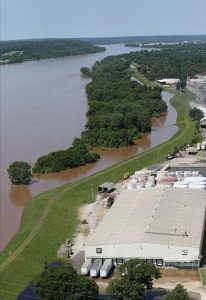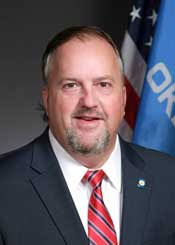
Jenks legislator Lonnie Sims is pushing for support of his bill designed to help Oklahomans in the event of future major floods like the 2019 Arkansas River flood.
The Republican Representative introduced House Bill 2776, the Oklahoma Hazard Mitigation Assessment District Act. It provides the framework for residents of each county to elect and establish a hazard mitigation assessment district.
House Bill 2776 is the first piece of legislation to be introduced following interim studies Sims hosted at the State Capitol in September and October 2019 to conduct a comprehensive review of the historic Arkansas River Flood of 2019.
“Oklahoma ranks third in the U.S. in Federal Disaster Declarations and is the only state in the top seven that does not border the ocean or gulf,” Sims said. “We have to empower our people with the ability to protect themselves from the natural disasters that traditionally put their farms, homes, businesses, cities, towns and lives at risk.”

“From generation to generation, one natural disaster after another, it’s hard not to become complacent to the tradition of tragedy that comes with living in Oklahoma,” Sims added. “We can no longer accept that more than half of Oklahoma communities have no access to flood insurance or even the basic resources for hazard mitigation, planning, disaster recovery and most disheartening, local matching dollars to qualify for millions in additional federal aid that victims so desperately need to recover.”
The Act has gained early support from the Indian Nations Council of Governments (INCOG), Association of County Commissioners of Oklahoma (ACCO), and the Tulsa Area Emergency Management Agency (TAEMA), which represents the most population-dense county in the state.
In his interim study presentation, Joseph Kralicek, Executive Director of TAEMA said, “One dollar of mitigation brings a return of seven dollars or more.”
Following the historic Memorial Day flood of 1984 that killed 14 as well as damaged or destroyed over 5,500 structures and 7,000 vehicles in the City of Tulsa, the first ever flood hazard mitigation team and utility assessment fee was approved to identify and exclusively fund flood mitigation projects throughout the city. This commitment and investment may have been fully realized in 2019 when no lives or structures were lost in the second largest flood on record.
“This bill would give counties a desperately needed tool to lessen the impacts of these risks and better protect the lives of all our citizens,” Kralicek said. “The risks to our population are not decreasing as time passes, and those disasters will continue to cost lives and millions of dollars if they can continue unabated, causing a public safety and public health issue.”
“We were honored to join Rep. Sims’ multi-level assessment of the Arkansas River flood of 2019. As the state’s Floodplain Board and Dam Safety administrator, and the agency responsible for the Oklahoma Comprehensive Water Plan, we see a real opportunity for our state to make lasting progress towards long-term disaster resiliency through coordinated local and regional planning and investment,” said Oklahoma Water Resources Board (OWRB) Executive Director Julie Cunningham. “We look forward to working with Representative Sims, Senator Rader, the Legislature, the governor, and all stakeholders to build upon the excellent disaster preparedness and response that Oklahoma’s emergency management professionals have delivered time and time again.”
“Natural disasters and the horrific damage they inflict have been a part of Oklahoma history for over a century,” said Trey Lam, Executive Director of the Oklahoma Conservation Commission. “I truly appreciate Representative Sims’ efforts to continue mitigation of flooding and multiple other disasters.”
According to Lam, Oklahoma farmers and ranchers know firsthand the damage floods, drought and wildfire can do to crops, homes, roads and bridges.
“Not only do agriculture producers lose income from one year’s crop, but they lose the resource, the soil, to produce food and fiber for many years to come,” Lam explained. “Putting decision-making in the hands of local citizens and officials, who set the priorities and pick solutions, is part of our conservation ethic.”
Sen. Dave Rader, (R-Tulsa), offered his strong support by signing on to author HB 2776 in the Senate. “I’m excited to join Representative Sims in authoring legislation that delivers local control to the people of Oklahoma,” Rader said. “Local citizens are most directly impacted by disasters and best equipped to determine the investment priorities to protect their communities.”
“The early support for this legislation has been humbling,” Sims said. “With every disaster comes a new opportunity to turn the lessons learned into tangible, curative actions that truly honor the thousands of victims who suffered. This bill is a great first step on the pathway to a safer future for Oklahoma, defined by Oklahomans.”
Source: Oklahoma House of Representatives





